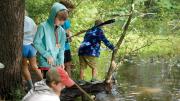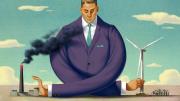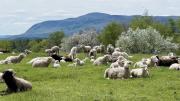1926 After closing the Memorial Hall commons because of students' "unsociable fashion of 'eating round' at cafeterias and lunch counters," President Lowell writes a letter to the Crimson challenging undergraduates to enter a prize-essay contest "...on the feeding of undergraduates" to help "remedy the most unsatisfactory condition in the social life of the University." The president laments that "[the students] are not aware of the pleasant hours, the interesting talk, and the lifelong friendships that come from the club tables of former times."
1931 A new rule is announced regarding "the entertainment of women in Harvard Houses": written permission must be obtained from the House master or senior tutor 24 hours prior to the visit--unless the visitors are mothers or sisters.
The Harvard Athletic Association reports an annual income of more than $1 million, mostly generated from football games. The Bulletin's editors warn, "So long as intercollegiate football is a million-dollar business, it is bound to seem correspondingly important. In helping to create this illusion, institutions of higher education are denying their own profession and working against the very purpose to which they are dedicated."
1936 The idea of an intercollegiate competitive athletic league, the "Ivy League," is proposed. The editors suggest the league might have the effect of "quickening enthusiasm for football among the undergraduates" and "would in fact give football added impetus."
1941 Following the attack on Pearl Harbor, nearly 6,000 students, faculty, and employees pack Sanders Theatre and stand outside Memorial Church to hear President Conant promise to use all Harvard resources "to help insure a speedy and complete victory."
1946 The Law School hires its first female faculty member, Soia Mentschikoff, as a visiting professor. The Bulletin editors note, however, that "students in the Harvard Law School always have been, are now, and (in the immediately foreseeable future) will continue to be Men Only..."
1951 The presidents of Harvard, Yale, and Princeton issue a joint statement declaring that no athletic scholarships are given out by their institutions. "The athletic program," they assert, "exists for the welfare of the student, for the contribution it can make to his healthy educational experience, not for the glorification of the individual or the prestige or profit of the college."
1956 The new Radcliffe Graduate Center, across the Common and on the far side of Brattle Street, is dedicated on November 3 with "ambassadorial representatives from 34 countries."
1961 An Office of Latin American Studies is established to foster increased research at Harvard on Latin American issues.
A University-wide committee has been appointed to investigate "what action, if any, the University should take to meet the possibility of physical injury or damage from fire or fall-out in the event of nuclear attack."
The Faculty of Arts and Sciences votes to admit women directly to the Harvard Graduate School of Arts and Sciences should Radcliffe College decide to cease admitting graduate students.
1966 Stokely Carmichael, national chairman of the Student Nonviolent Coordinating Committee, addresses 800 people in Sanders Theatre.
1971 Newly installed President Bok and nine members of his staff accept a challenge from the Crimson to play a game of six-man touch football. The game ends in a 6-6 tie, but the Crimson, note the Bulletin's editors, claims to have triumphed by a score of 23-2.





